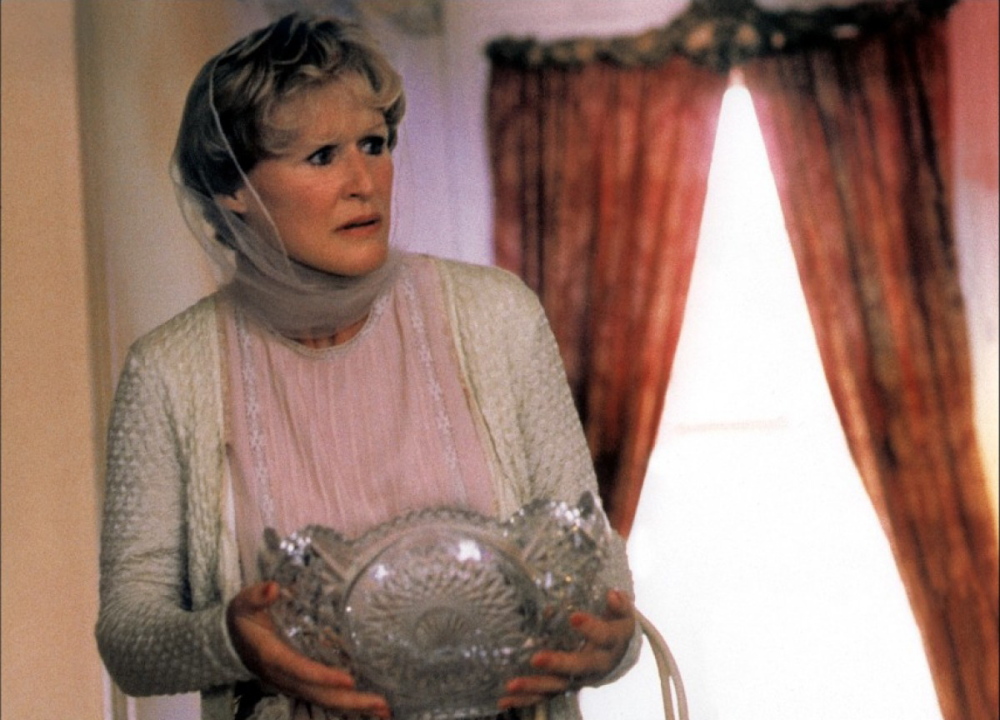“Cookie’s Fortune” … The fall of the house of Orcutt
The Italians of the 18th century created a wonderful art form called “opera buffa,” a comic opera, usually done in hilarious short scenes, drawn with characters from everyday life. Robert Altman, one of American films greatest outliers, has discovered “opera buffa.”
With the viewing of “Cookie’s Fortune,” my vote goes for the film as Glenn Close’s and Robert Altman’s best. I’ll get letters, I know. I don’t care. Let’s just say it’s my weakness for the Southern mystique, for the stained-glass madness of its people, as carved out by the likes of Tennessee Williams and Truman Capote.
I know the Southern theme has been a Hollywood staple in drama and comedy, and often overdone; but once they open a movie with a deserted street on a hot Southern night, I’m gone. There is a mystical charm in the madness of the Southern soul, a perfume blend of magnolia and humid mold that runs deep in my family DNA.
Thus Altman and October Films give us “Cookie’s Fortune.” Imagine a blend of Tennessee Williams’ “A Streetcar Named Desire” and “The Fugitive Kind,” re-written by Woody Allen and Steve Martin, and cast by the Saturday Night Live crowd.
Altman works with a screenplay by short story writer Anne Rapp, who clearly knows her way through the jungle of a screenplay. Rapp sets us down in the sweet darkness of Holly Springs, Miss., the ancestral home of the Orcutt family, where we first meet Willis (a perfect Charles S. Dutton), a sweet, Wild Turkey-soaked handyman on his way home from the local black blues bar, where he will wake up his friend and boss, Jewel Mae “Cookie” Orcutt (the late Patricia Neal), who will make Willis some coffee and watch him clean a table full of her late husband’s antique pistols. Altman meets Chekhov.
Willis and Jewel have been together since he was a boy and she was a Southern belle. Willis holds Jewel and her house together. They are both loved by the town and are part of the legend of the Orcutt family.
But life is at its tattered ends for Jewel. She misses her late husband, Buck, and longs to join him in the great bayou of heaven.
Spoiler alert: On Easter Sunday, Jewel will take one of the pistols, lie down on the bed, put a pillow on her face and blow her brains out. We will miss Jewel, but it had to be, otherwise this wonderful “opera buffa” would not play out. Hold on. It starts with wonderful. It ends with fabulous.
Meet Camille Dixon (a brilliant Glenn Close), who is directing Holly Springs’ little theater group engaged in rehearsing, for Easter night presentation, Oscar Wilde’s “Salome,” in the local Baptist church.
It stars Camille’s baby sister Cora (Julianne Moore) playing Salome with a Paula Deen accent. We have all seen Moore do interesting things. Here she walks the wild side. Trust me. Watch this one. Watch what Moore does with her lips and her eyes. Her Cora is clearly one magnolia blossom short of a full bouquet. She is a feral flower dipped in honey.
On Easter morning, Camille and Cora go to retrieve a cut-glass fruit bowl from Cookie’s house and discover her body, covered with pillow feathers, gun dripping from her fingers like a sauce spoon. Camille goes mad — well, a deeper shade of mad. She feels that a suicide would be a blemish on the Orcutt family tapestry, so she violates the crime scene to make it appear to be a robbery and murder. Whom do you think will be a suspect? Of course. The local sheriff (Ned Beatty) knows Willis is not guilty, but Camille has eaten the suicide note. Yes. She just ate it.
As in traditional opera buffa, a resolution is provided. You’ll want to be there for that. Throughout, you will be entertained by the constant sexual activity of the local boy-and-girl act, deputy Chris O’Donnell and local bad girl Liv Tyler, backed up by Sheriff Ned Beatty, prosecutor Courtney B. Vance, local attorney Donald Moffat, catfish salesman Lyle Lovett and assorted villagers. Director Altman fills his screen, as he always does, with a dazzling assortment of local characters.
“Cookie” is, without a moment’s doubt, Close’s picture. Her Camille is a brilliant blend of Blanche DuBois, Norma Desmond and “Rebecca’s” Mrs. Danvers. She is so good here, that after 30 minutes, you’ll want to strangle her. Her final moments in the jail cell scene are classic, where the term “over the top” is re-defined. But watch Julliane closely.
Robert Altman is, as always, the great Robert Altman. Not since his 1970 “M*A*S*H” has he wrangled so many wild characters in one film. Bravo, Robert.
J.P. Devine is a Waterville writer and former actor.
Send questions/comments to the editors.




Success. Please wait for the page to reload. If the page does not reload within 5 seconds, please refresh the page.
Enter your email and password to access comments.
Hi, to comment on stories you must . This profile is in addition to your subscription and website login.
Already have a commenting profile? .
Invalid username/password.
Please check your email to confirm and complete your registration.
Only subscribers are eligible to post comments. Please subscribe or login first for digital access. Here’s why.
Use the form below to reset your password. When you've submitted your account email, we will send an email with a reset code.